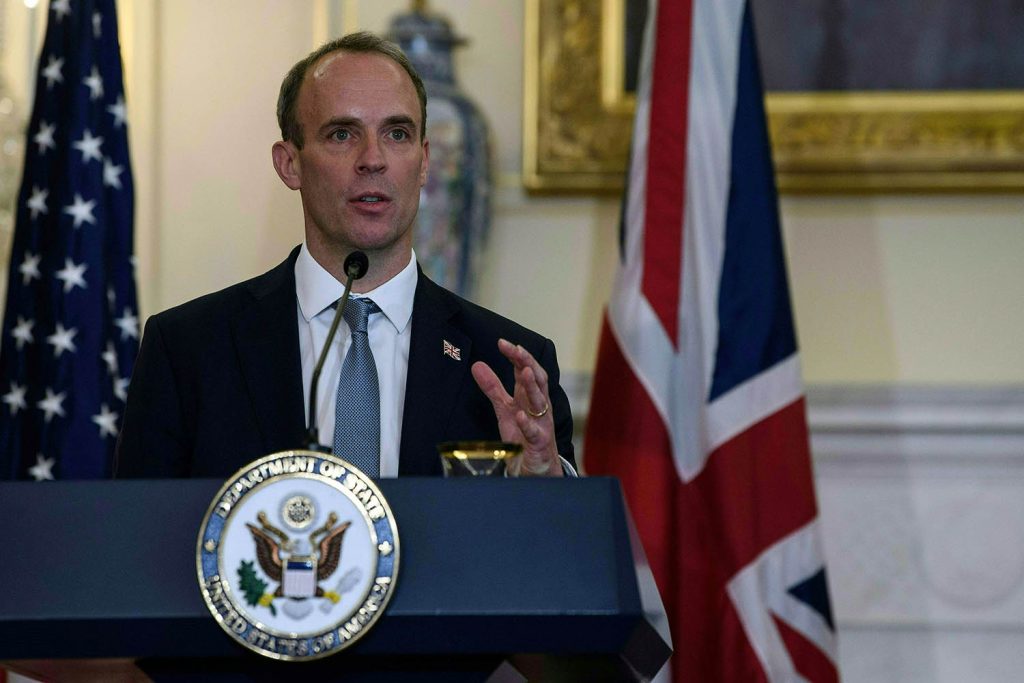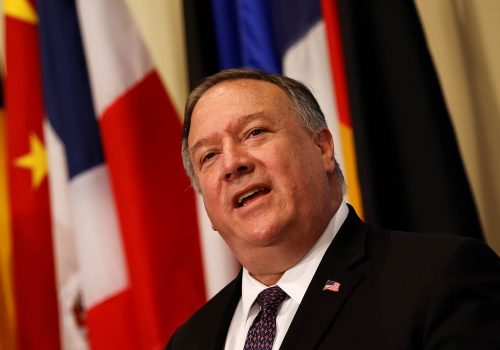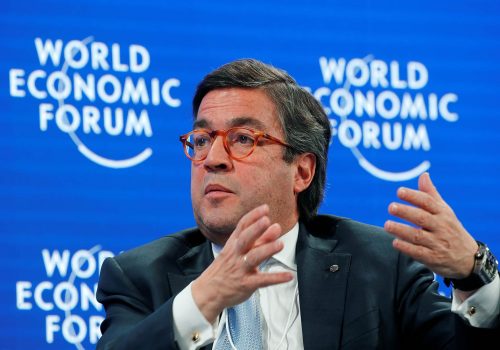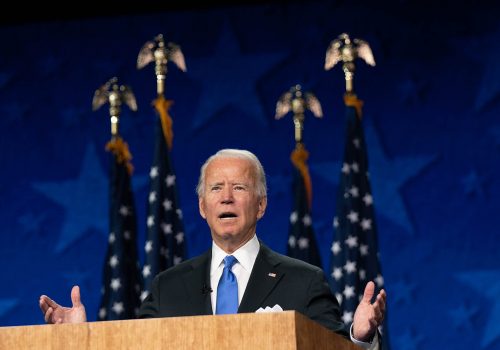Amid continuing uncertainty about the exact economic and political relationship between the United Kingdom and the European Union, British Foreign Secretary Dominic Raab explained that the United Kingdom wants to “be masters of our own destiny, not just domestically, but [also] in terms of the approach we forge internationally.”
Speaking at an Atlantic Council Front Page event on September 17, at the end of a trip to the United States, Raab downplayed concerns about new UK legislation that European Union officials believe could violate the Withdrawal Agreement and the Good Friday Agreement by restricting the open border between the Republic of Ireland and Northern Ireland. Raab maintained that the UK government has “committed to all the things we said we would do in the Withdrawal Agreement,” and reported that his discussions with US officials and lawmakers in Washington gave him the opportunity to clarify the UK’s view, especially as the possibility of a UK-US free-trade deal beckons.
Moving beyond the current concerns about how Britain will finalize its exit from the European Union, Raab stressed that while the UK will remain in close partnership with its traditional US and European allies, Brexit will allow the UK to play a larger role globally, engaging with partners in the Pacific and championing concepts like free trade and human rights.
Here’s a brief look at what Raab said about the post-Brexit future, a US-UK trade deal, and other top international issues:
Brexit drama continues
- No hard border: The UK’s new Internal Market Bill has drawn concern from policymakers in Brussels and Washington over fears that the pending legislation, which would give the British government the ability to override parts of the Withdrawal Agreement in order to preserve the UK’s internal market with Northern Ireland, would create a hard border between the Republic of Ireland and Northern Ireland, in violation of the Good Friday Agreement. Raab dismissed these concerns, describing the bill as giving the British government a “proportionate” and “precautionary” power to avoid a “regulatory border down the Irish Sea.” He emphasized that the British government has “been really clear, we’ve given the absolute unconditional commitment: no hard border; no extra infrastructure will be erected on the Northern Ireland-Republic Border.”
- Brussels can help: Raab further argued that the European Union could “alleviate” all the “uncertainty” with the Irish border question if it “made the same unilateral commitment that the UK has made” to avoid a hard border between Northern Ireland and the rest of the United Kingdom. With all of the attention on preserving the EU single market, he noted that there are also “obligations which go the other way” to protect the UK’s internal market too.
A US trade deal before November?
- Listening to concerns from Congress: Raab’s visit to Washington included a meeting with Speaker of the House Nancy Pelosi (D-CA) and followed a statement from presidential candidate Joe Biden that suggested a violation of the Withdrawal Agreement or the return of a hard border between the Republic of Ireland and Northern Ireland would jeopardize a US-UK trade deal. Raab reported that he listened to concerns from Pelosi and Congressman Richard Neal (D-MA) and assured them that Brexit is an “ongoing process.” He added that the British government has long known that “the Irish caucus on the Hill [and] the Irish communities [in the United States] would be conscious and concerned about this.”
- “Great progress” on trade deal: Despite the concern from Congress, Raab said that US and UK negotiators are continuing their work on a free-trade agreement. He said discussions should not be difficult as “if you look at our economies, they are very complementary. You can see the wins for the US, you can see the wins for the UK.” While he cautioned that he did not know if an agreement could be finalized before the November US elections, he said he wanted to continue the momentum. “Let’s go for it,” he said, adding that he thinks “we can get this over the line.”
A post-Brexit identity for the UK
- Britain still in Europe, but elsewhere too: Despite the tense, ongoing negotiations with Brussels about the UK’s EU exit, Raab asseerted that “we are leaving the political club, [but] we are not leaving Europe geographically.” Brexit, however, will allow Britain to play a much wider role around the world, he argued. “You will see a tilt toward the Indo-Pacific region,” he said, especially as tensions with China increase and the UK puts more emphasis on other “agile coalitions of the like-minded,” including countries such as India, Japan, Australia, and Canada.
- “Buccaneering” on trade: Free from needing to align with the European Union’s common trade policy, Raab said a big initial post-Brexit focus will be on pursuing free-trade agreements with the United States and others. “We want to be a global free-trade champion,” he said. “We believe in free trade and think the world needs it,” he added, arguing that staking out that position not only makes economic sense, but also provides a “strategic opportunity to show the world that with the wave of protectionism that we have seen from various corners, that actually there are these free-trade deals that can still be done.”
- A new Britain: The United Kingdom also wants “to forge a distinct identity in the world,” Raab explained, focusing on things like free trade and human rights, but also on scientific innovation and humanitarian aid. The recently announced merging of the Department for International Development into the Foreign and Commonwealth Office is part of this push, Raab said. He argued that there is a prevailing belief that “somehow what you do with your aid is a moral dimension and separate from your national interest. I think that is a mistake.” He pointed to the UK’s work on ensuring that a future coronavirus vaccine is distributed both to the UK population and given to more vulnerable countries, as an example of both fulfilling a moral imperative and protecting the national interest. Protecting other countries “will stop a second wave of dominoes from reaching back to the UK,” he noted.
Closer attention on China
- A growing democratic coalition: Raab posited that one of Britain’s most important roles post-Brexit will be to help forge valuable international coalitions and partnerships, with one of the prime objectives being countering the rise of China. “The most important thing” in responding to Beijing’s aggression, he said, “is to be able to act in concert with our closest friends and also then broaden out, if you like, the coalition or consensus of like-minded countries that share the values.”
- Club for 5G? Raab identified the need to find an alternative to Chinese 5G technology as a major area for closer international coordination. While there have been high-profile disagreements between the United States and its allies about the use of 5G systems from the Chinese company Huawei, Raab clarified that he doesn’t think “there is any difference between any of us as countries of the Five Eyes or the UK and the US in relation to the problem. The question is can we address it.” He noted that the UK government has already revised its initial position regarding the use of Huawei, and the attention is now on building “a caucus of bigger diversified supply-chain high-trust vendors” to provide the same services.
- Hong Kong actions send a message: The UK government adopted a number of measures in response to China’s new national-security law for Hong Kong, which threatened to undo the “one nation, two systems” model that preserved democracy in the former British possession. Raab said his government’s actions, which included suspending an extradition treaty and offering potential UK citizenship to three million Hong Kong residents, demonstrates to Beijing that Britain “will always stand up for our values.”
Pressure needed on Russia and Belarus
- Moscow needs to provide answers on Navalny poisoning: This commitment to defending values must extend to pushing back against the Kremlin, Raab said. He denounced the attempted assassination of Russian opposition leader Alexei Navalny with the chemical agent Novichok, saying that the evidence so far makes it “very difficult to see any plausible alternative, than not just that this happened in Russia and by some Russia group, but that it was by the Russian state.” He said the burden to provide alternative explanations “is now firmly in the Russian government’s court” and if they cannot come up with an answer “we need to make sure there is a cost.” If the West fails to respond to this, Raab warned, “the Kremlin will keep doing it” and next time “it could be one of our citizens.”
- Time running out for Belarus: Raab cautioned that there is “a vanishing window” for the prospects of political change in Belarus, as Belarusian President Alyaksandr Lukashenka and Russian President Vladimir Putin could “just kind of sit this out.” That is why the United Kingdom and sixteen other countries triggered the Organization for Security and Cooperation in Europe (OSCE)’s “Moscow Mechanism,” which will launch an independent investigation into both the alleged vote-rigging in the recent presidential election and potential human-rights abuses. The move, Raab argued, will provide evidence of Lukashenka’s actions and make it “very hard for Lukashenka to just carry on as normal.” While the UK and its allies need to ensure that there is “space for dialogue” in order to provide a window for a political transition, Raab added that this must be coupled with “a really big cost if the regime in Moscow and in Belarus do not move.”
Shifting dynamics in the Middle East
- Peace deals welcome, but Iranian threat remains: Raab lauded the recent US-brokered peace deals between Israel and the UAE and Bahrain as having the potential to shift “the dynamic in the Middle East,” but he cautioned that “the essential problems and challenges” in the region continue to “emanate from Tehran.” While the UK continues to oppose the US withdrawal from the Joint Comprehensive Plan of Action (JCPOA) nuclear deal with Iran, Raab added that Britain agrees that “we cannot tolerate Iran acquiring nuclear weapons.” The UK is “not going to junk the JCPOA,” he added, “until we have something better to put in its place.”
- More help to Yemen: Raab also pointed to the September 17 announcement that the UK will increase its aid to Yemen by £5.8 million this year, taking the total amount of aid to over £1 billion. The UK is increasing its commitment, Raab explained, as Yemen suffers from a “triple whammy of COVID, conflict, and now potentially an acute famine.” The new aid will focus on alleviating the famine and will be coupled by continued UK engagement on the issue at the United Nations Security Council, he vowed.
David A. Wemer is associate director, editorial at the Atlantic Council. Follow him on Twitter @DavidAWemer.
Further reading:
Image: British Foreign Secretary Dominic Raab speaks during a news conference with U.S. Secretary of State Mike Pompeo at the State Department in Washington, U.S., September 16, 2020. Nicholas Kamm/Pool via REUTERS



